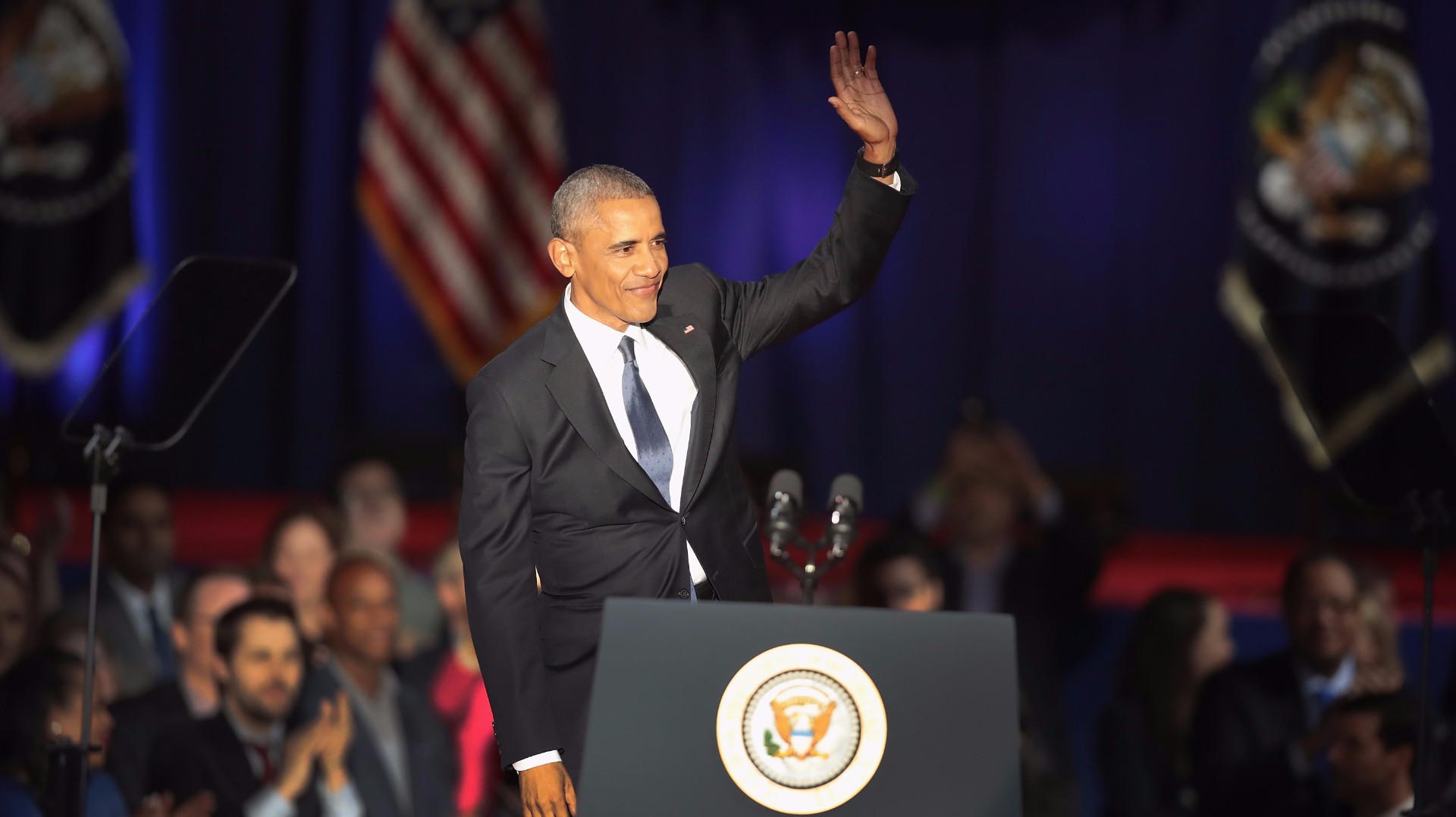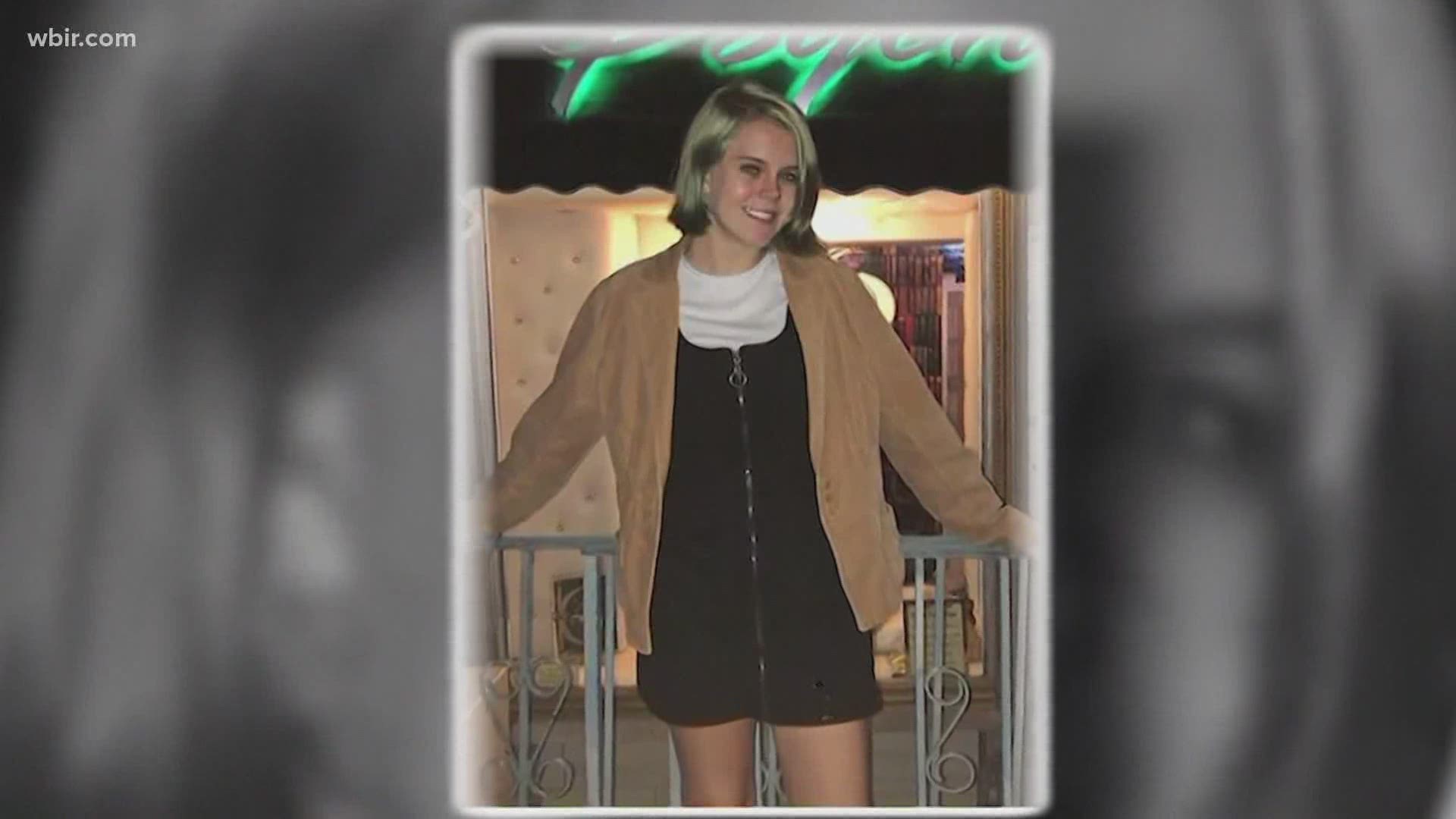It was little more than eight years ago and three miles away that Barack Obama embraced the promise of his presidency, addressing a jubilant crowd in Chicago's Grant Park at a victory celebration on election night 2008.
A political lifetime later, before a sea of supporters at McCormick Place, Obama on Tuesday delivered what is expected to be his final formal address to the nation. His hair was grayer, his tone more somber. And since election night 2016, his message has been aimed at rallying downcast supporters and defending a legacy that his successor has vowed to dismantle.
In his speech, he recited a litany of his proudest achievements, among them the economic recovery from the Great Recession, the diplomatic outreach to Cuba, the nuclear accord with Iran, the death of Osama bin Laden, the extension of health care coverage to 20 million people and more.
"That's what we did," he said to cheers. "That's what you did. You were the change. Because of you, by almost every measure, America is a stronger, better place than it was when we started."
Still, while Obama is finishing his term with a healthy approval rating — ahead of President-elect Donald Trump's standing by double digits in a Quinnipiac University Poll released Tuesday — the election of a political nemesis as his successor poses grave risks to what he leaves behind on everything from health care to climate change.
The situation includes this ironic twist: Trump initially built a political following by questioning Obama's birthplace and the legitimacy of his presidency. Now, as he prepares to turn over the White House to Trump, Obama finds himself defending the legitimacy of Trump's presidency, insisting to skeptics that the election of this new commander in chief doesn't represent an apocalypse that threatens American democracy.
He quieted boos from the audience when he noted that a new administration would over in 10 days, lauding "the peaceful transfer of power from one freely elected president to the next."
When the crowd chanted "Four more years!" to drown out a protester, he said with a smile, "I can't do that."
Obama was speaking amid a new and potentially explosive controversy involving Trump. CNN first reported, and USA TODAY and other news outlets confirmed, that Obama and Trump last week were given classified documents that included unverified allegations from Russian operatives who claimed to have compromising personal and financial information about Trump. The president-elect denounced the report in a tweet, deriding it as "#fakenews."
Obama's decision to deliver a farewell address, and the unprecedented venue he chose for it, is part of his effort to make the case for his legacy and rally his reeling party. He is all too aware of the impact Hillary Clinton's defeat in November is likely to have on his legacy, one reason he and Michelle Obama campaigned so fiercely on her behalf.
During the 2008 campaign, Obama raised the hackles of some Democrats when he told The Reno Gazette-Journal that Ronald Reagan had "changed the trajectory of America in a way that Richard Nixon did not and in a way that Bill Clinton did not. He put us on a fundamentally different path because the country was ready for it."
It wasn't just a matter of timing, though. Reagan's impact endured in part because he was succeeded in the Oval Office by his vice president, George H.W. Bush, who articulated his own message but also helped cement Reagan policies.
Now Obama will be succeeded by a new president elected with a promise to repeal Affordable Care Act, reject the Pacific trade accord, withdraw from the global climate-change agreement, undo the Iran nuclear deal and reverse his executive orders on immigration and the environment.
Consider the comments by a senior Trump adviser in an interview with USA TODAY Monday about Obama's farewell address. "It's a great idea for him to do this," Kellyanne Conway said, "because he knows that a great deal of what he did is not going to survive this next presidency, or maybe even this next month, in some cases."
There has been an accelerating sense of time running out for the Obama team as attention shifts to Trump. During coverage Tuesday of Senate confirmation hearings for Trump's nominees for attorney general and Homeland Security secretary, MSNBC and CNN displayed countdown clocks in a corner of the TV screen, ticking off the hours until Obama's final big speech.
Obama didn't directly criticize Trump, but he did pointedly declare his position on issues that divide them.
"Democracy can buckle when we give in to fear," he cautioned. "So just as we, as citizens, must remain vigilant against external aggression, we must guard against a weakening of the values that make us who we are. ... That’s why we’ve ended torture, worked to close Gitmo, and reform our laws governing surveillance to protect privacy and civil liberties. That’s why I reject discrimination against Muslim Americans."
There is no long-standing tradition that departing presidents deliver formal farewell addresses, separate from their final State of the Union speeches, according to Gleaves Whitney, a professor at Grand Valley State University in Michigan and author of American Presidents: Farewell Addresses to the Nation, 1876-2001. Just nine previous presidents have done so, starting with George Washington but most of them in modern times.
Washington, Andrew Jackson and Andrew Johnson delivered farewell addresses in writing. Close to a century later, Harry Truman revived the tradition with a televised address, followed by Dwight Eisenhower, Jimmy Carter, Ronald Reagan, Bill Clinton and George W. Bush.
No previous president chose to deliver it to a huge hometown audience and in a venue that echoed the biggest campaign celebrations.
His speech was conversational and personal, citing both progress made during his tenure and problems that remain. That included issues of race that predictably persisted despite his groundbreaking election as the first African American elected to the White House. He faulted members of both parties for living in "bubbles" that make understanding and action more difficult on the most intractable problems. "If you’re tired of arguing with strangers on the Internet, try to talk with one in real life," he said to laughter.
Again and again, he called on American citizens to participate in their democracy.
"Our Constitution is a remarkable, beautiful gift," he said. "But it’s really just a piece of parchment. It has no power on its own. We, the people, give it power, with our participation and the choices we make — whether or not we stand up for our freedoms, whether or not we respect and enforce the rule of law. America is no fragile thing. But the gains of our long journey to freedom are not assured."
In the speech in 2008, Obama called for moving beyond partisan divides. "Let's resist the temptation to fall back on the same partisanship and pettiness and immaturity that has poisoned our politics for so long," he told the crowd.
But in his address Tuesday night, he was addressing a nation with divisions that have only gotten deeper and angrier.
And on Wednesday morning, the president-elect is slated to grab the spotlight as he held his first formal news conference as president-elect while the Senate is scheduled to begin voting to repeal Obamacare.


